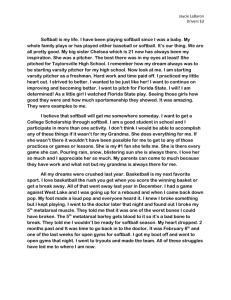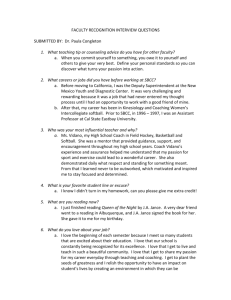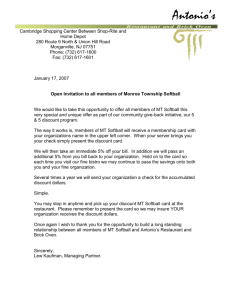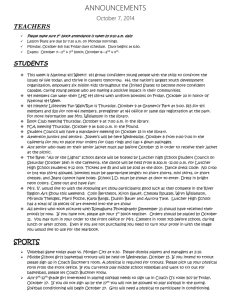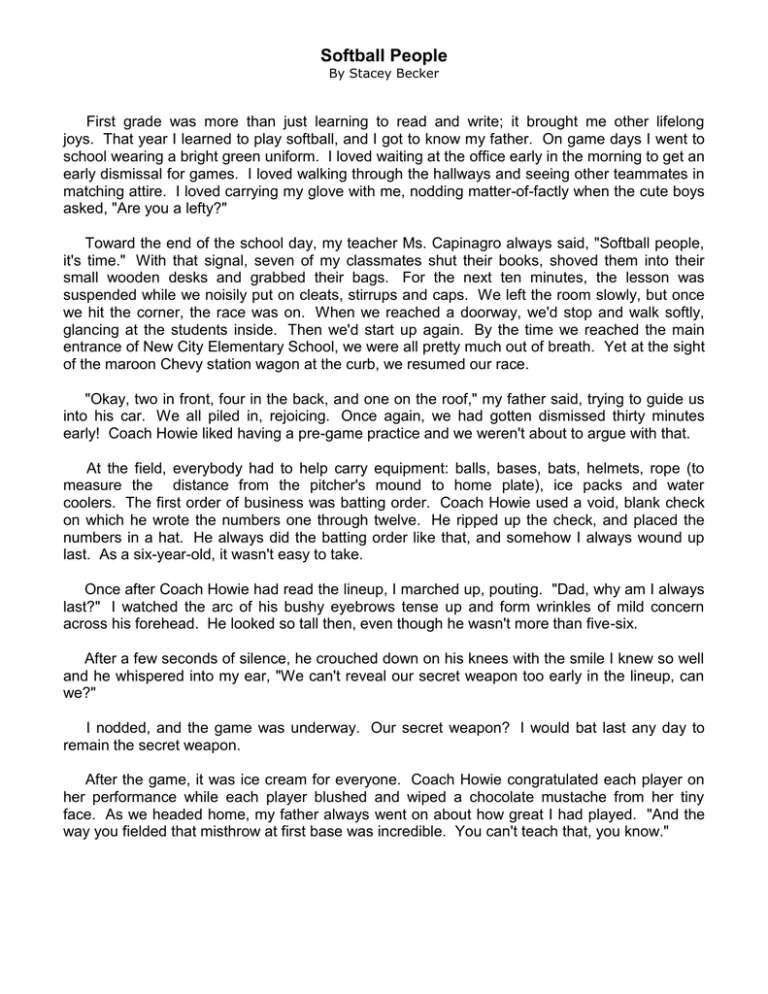
Softball People
By Stacey Becker
First grade was more than just learning to read and write; it brought me other lifelong
joys. That year I learned to play softball, and I got to know my father. On game days I went to
school wearing a bright green uniform. I loved waiting at the office early in the morning to get an
early dismissal for games. I loved walking through the hallways and seeing other teammates in
matching attire. I loved carrying my glove with me, nodding matter-of-factly when the cute boys
asked, "Are you a lefty?"
Toward the end of the school day, my teacher Ms. Capinagro always said, "Softball people,
it's time." With that signal, seven of my classmates shut their books, shoved them into their
small wooden desks and grabbed their bags. For the next ten minutes, the lesson was
suspended while we noisily put on cleats, stirrups and caps. We left the room slowly, but once
we hit the corner, the race was on. When we reached a doorway, we'd stop and walk softly,
glancing at the students inside. Then we'd start up again. By the time we reached the main
entrance of New City Elementary School, we were all pretty much out of breath. Yet at the sight
of the maroon Chevy station wagon at the curb, we resumed our race.
"Okay, two in front, four in the back, and one on the roof," my father said, trying to guide us
into his car. We all piled in, rejoicing. Once again, we had gotten dismissed thirty minutes
early! Coach Howie liked having a pre-game practice and we weren't about to argue with that.
At the field, everybody had to help carry equipment: balls, bases, bats, helmets, rope (to
measure the distance from the pitcher's mound to home plate), ice packs and water
coolers. The first order of business was batting order. Coach Howie used a void, blank check
on which he wrote the numbers one through twelve. He ripped up the check, and placed the
numbers in a hat. He always did the batting order like that, and somehow I always wound up
last. As a six-year-old, it wasn't easy to take.
Once after Coach Howie had read the lineup, I marched up, pouting. "Dad, why am I always
last?" I watched the arc of his bushy eyebrows tense up and form wrinkles of mild concern
across his forehead. He looked so tall then, even though he wasn't more than five-six.
After a few seconds of silence, he crouched down on his knees with the smile I knew so well
and he whispered into my ear, "We can't reveal our secret weapon too early in the lineup, can
we?"
I nodded, and the game was underway. Our secret weapon? I would bat last any day to
remain the secret weapon.
After the game, it was ice cream for everyone. Coach Howie congratulated each player on
her performance while each player blushed and wiped a chocolate mustache from her tiny
face. As we headed home, my father always went on about how great I had played. "And the
way you fielded that misthrow at first base was incredible. You can't teach that, you know."
Softball People
By Stacey Becker
It was in this way that I learned to love softball. Our green "Bears" uniforms worn when the
parents pitched to the players changed to blue "Angels" apparel once we reached second grade
and a member of the team could handle pitching, but Coach Howie was still our leader. First
grade through sixth, he didn't miss a single game. Players came and went, but everybody loved
to play for Howie. Everybody fielded, and everybody batted. At the end of each season, he
organized a parent-versus-child softball game. He would always get up to the plate, with ten
bats in his arms, and pretend he forgot that first base and not third is where the runner had to
go.
It was at the last one of these particular games, the spring of sixth grade, when I realized that
my softball days under Coach Howie would soon be over. The players' parents had gotten
together and collected money for a gift.
Nobody said anything, but we all knew that this was the last game that my father would ever
coach. He unwrapped the gift, a plaque inscribed with all of our names and a huge, "Angels
1989." He read the top aloud: "To Coach Howie, a Little Guy with a Big Heart, We Thank
You." With tears forming in his eyes, he could only say repeatedly, "This is so nice,
thanks." Sitting on a checkered blanket, eating a hot dog and munching on some chips, a lump
formed in the pit of my stomach. Little League had ended, and with it the days of playing for
Coach Howie.
In ninth grade, when most people took the bus, I convinced my father that if he drove me, I
could sleep a whole forty-five minutes later and therefore do better in school. When he'd pull up
to school, some of his former softball players and some other friends would see my father and
wave.
In high school, my interest in friends and boyfriends sometimes took priority over my
family. My father always tried to include himself. It was amazing how much gossip he could
pick up by reading The New York Times on the steps outside of my room. My telephone rang
nonstop and when I shut my door for privacy, he wouldn't leave me alone until I told him who it
was.
"You're so nosy," I said. "Don't you have anything better to do?"
"No," he said. "Anyways, you're going to miss me when you go off to college. I've got to
annoy you now as much as I can."
In senior year, major decisions had to be made. Where would I be going to college? The
day I got accepted to the University of Pennsylvania, my father brought flowers to my softball
game. I had never seen him speechless since the day he had accepted that plaque from our
old team's parents. My heart pounded with joy at how proud he was of me. He drove me to
meet the softball coach after I learned that they were recruiting me for softball. As we walked
around the campus that day, I felt that something very secure and supporting was slipping away
and an entirely new world was waiting for me to enter.
After weeks of debate I chose to go to Emory, a smaller school with a more comfortable
environment. My father had a difficult time understanding why I chose a school so far away.
Softball People
By Stacey Becker
"But Emory doesn't have a softball team," he pleaded one day. Once I had made my
decision to go there, he said, "Maybe you can start one."
As a junior in college, I did manage to start a softball club after showing the administration
that there was a high interest in fast-pitch softball.
Laws like Title IX, demanding equal numbers of varsity sports between men and women's
teams, carved a path for me to push for an Emory team. I found many students who, like
myself, craved to play.
With two practices a week and over twenty girls showing up each time, we competed in
scrimmages. Then the campus sports office found a softball team from a neighboring college
who was looking for an opponent. In the spring, the softball club played in the first-ever
women's fast-pitch softball game at Emory. Packing up equipment in the dugout, I realized that
out of the fifteen years I had been playing softball, that game was the first one my father had
ever missed.
During my senior year at Emory University, I became captain of the first-ever women's
Varsity Softball team. With a brand-new field, uniforms and seventeen teammates, it has been
an exciting experience. There is nobody happier than my father.
"Just think, Stacey," he said. "You will be part of history."
Although I love softball, what I want more than anything is to have my father back.
"But Dad, it doesn't mean a thing to me if you can't be there," I said. I want to get picked up
from school early and go run towards his car. I want to hear him outside of my door asking me
who is on the phone. I want to look over into the bleachers during a game and see his
reassuring smile.
As for life after college, my father has informed me that whatever I do, I must do it closer to
home. "Your mother won't be able to handle it if you're not around here," he said. "Maybe you
can move back into your old room."
"Don't worry about it, Coach," I said. "I'll still call you all the time from wherever I am."
I hung up the phone and stared at a recent picture of my parents. My father looked older and
a bit tired. His bushy eyebrows showed hints of gray and white. What stood out the most was
his navy-blue sweatshirt with the letters EMORY, across his chest. I put on my socks and
metal-spiked cleats and got ready for practice. I have to work hard. After all, I'm not
guaranteed even the last spot in the lineup anymore. I've come a long way since first grade,
and I owe much of my success to Coach Howie. It's an extra blessing to know that although
he's no longer my softball coach, he'll always be my dad.
Reprinted by permission of Stacey Becker (c) 1999 from Chicken Soup for the Father's Soul by
Jack Canfield, Mark Victor Hansen, Jeff Aubery, Mark Donnelly and Chrissy Donnelly. In order
to protect the rights of the copyright holder, no portion of this publication may be reproduced
without prior written consent. All rights reserved.


